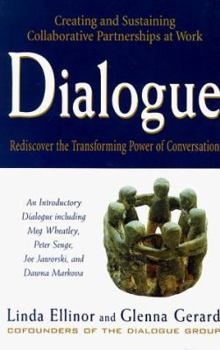Dialogue: Rediscover the Transforming Power of Conversation
A dynamic new system for fostering effective communications within groups, Dialogue breaks down barriers, creates partnerships, and helps team members achieve optimal results. In this book, managers learn how to use the full range of Dialogue methods, including its four fundamental techniques: suspension of judgment, listening, identification of assumptions, and inquiring/reflection.
Format:Hardcover
Language:English
ISBN:0471174661
ISBN13:9780471174660
Release Date:February 1998
Publisher:Wiley
Length:416 Pages
Weight:1.70 lbs.
Dimensions:1.3" x 6.2" x 9.2"
Customer Reviews
4 ratings
Useful stuff
Published by Thriftbooks.com User , 21 years ago
This book was a much more detailed exploration of the topic of dialog. It began with a scattered, pretty useless dialog between some academics and consultants transcribed from a group phone call they made. I found this painful to get through as it was a real collage of different ideas and their latest `thoughts' they all needed to share. They didn't seem to be talking `to' each other, but that was probably due to the fact that they were on the phone and that they are all so full of ideas on the subject that they couldn't help but blabber on and on when they each had a chance. While it avoided a lot of the `metaphysical' aspects of Dialog (as compared with the previous book - "Spiritual Art of Dialog" that I read before this), it did tend to oversimplify problems in the workplace a bit in my opinion. The first parts of the book offered some great tips on how to engage in, and maintain a positive dialog. It talked about intentions as being very important, and suspending one's own assumptions and judgments that were useful. It also stressed the importance of being a good listener and asking good questions. There were few tips on how to gauge nonverbal queues, which I think would have been useful, but there were a lot of suggested activities to get better at it. The point I think they were making were that nonverbal queues are specific to individuals and can't be readily identified generally. There was talk of inquiry (asking questions) and also of reflection (taking moments and going slowly) which was also interesting. Then the part of the book that most interested me were the practical tips that management could take to implement better dialog in the workplace. Although they were very skeptical of it working in long-term ways in most circumstances, which took away from the authority of the book, and in that way they seemed to undermine what they were advocating. There was also discussion of group evolution dynamics, and the four stages of a group. They did get slightly metaphysical in talking about mysterious group energies and such, but I took it all with a grain of salt. The idea of shared leadership seemed powerful if properly implemented, but they also pointed out some very dangerous aspects that can go along with implementing it and that should be watched for.
not a ground breaker, but a worthwhile read
Published by Thriftbooks.com User , 25 years ago
This book is not an eye-opener, it appears to be going over ground that has been covered before. But for those of us who are grappling with the concept of utilizing DIALOG in organizational change and development, an approach that skims the surface, explains the benefits and touches on different issues while pointing you to a place where you can do more research is probably more useful than an in-depth study of the more esoteric features.
A fantastic book!
Published by Thriftbooks.com User , 26 years ago
Dialogue is a next generation tool for creating collaboration, effectiveness, and a sense of community within organizations. After studying this topic for several years, including participating in events sponsored by Scott Peck's Foundation for Community Encouragement (Seattle, WA), I have found this recently published book to be the definitive work available on this topic. The book is readable, practical, insightful, and wise. The only thing I couldn't obtain from the book was the direct experience of participating in dialogue with others, but I look forward to attending one of the authors' public seminars on this topic in the near future.
Dialogue is a high level resource.
Published by Thriftbooks.com User , 26 years ago
Many people have the sense that all is not as it should be in organizations today and are experiencing an underlying ache of discontent. The new sciences are heralding an increase in the speed and complexity of our lives and work, yet we gaze at the approaching new century while still mired in the old. Our accumulated ways of thinking, belief systems, norms, values, and shared meanings take us away from what we say we want most from organizational life: high productivity, satisfying relationships, meaningful work. Ellinor and Gerard have given voice, order and argument to that which seems to be uncommon common sense. For those of us who are committed to promoting and supporting organizational efforts for equity and valuing diversity, their representation of the power tool of dialogue renews the urgency of doing the work deeper and better with our clients, and with each other.






